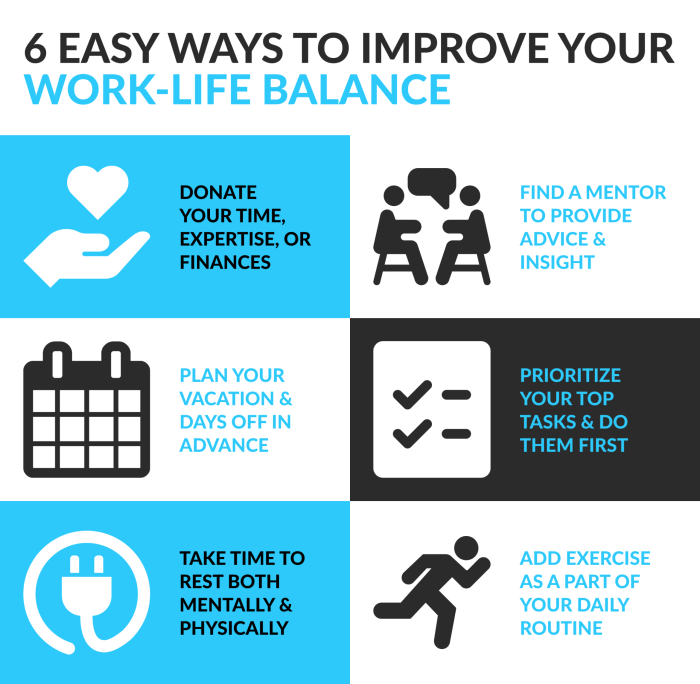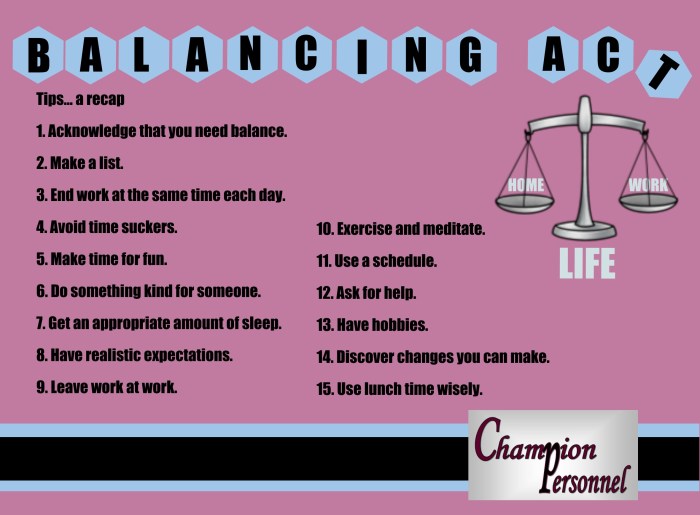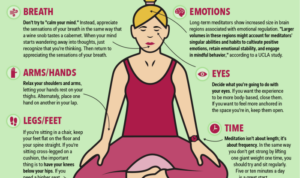Work-Life Balance Tips: Finding Harmony in a Hectic World kicks off with a bang, offering a sneak peek into the secrets of juggling work and life like a pro. Get ready for a ride filled with strategies, healthy habits, and remote work insights to level up your balance game.
In a world where the hustle never stops, maintaining equilibrium between work and personal life can be a real challenge. Dive in to uncover the keys to unlocking a more balanced lifestyle.
Importance of Work-Life Balance
Achieving a work-life balance is essential for maintaining overall well-being. When individuals prioritize their personal lives alongside their professional responsibilities, they experience reduced stress levels, improved mental health, and increased productivity.
Negative Impacts of Imbalance
An imbalance between work and personal life can have severe consequences on both physical and mental health. Individuals who work excessively long hours or neglect their personal relationships may experience burnout, anxiety, depression, and even physical ailments such as heart disease and insomnia.
- Chronic stress from work-related pressure can lead to a weakened immune system, making individuals more susceptible to illnesses.
- Neglecting self-care and relaxation can result in fatigue, lack of motivation, and decreased job satisfaction.
- Poor work-life balance has been linked to higher rates of absenteeism and presenteeism in the workplace, ultimately impacting overall productivity and performance.
According to the American Institute of Stress, 80% of workers feel stress on the job, with nearly half saying they need help in learning how to manage stress.
Strategies for Achieving Work-Life Balance
Achieving work-life balance is crucial for overall well-being and productivity. Here are some strategies to help you maintain harmony between your professional and personal life.
Setting Boundaries Between Work and Personal Life
It’s essential to establish clear boundaries between work and personal life to avoid burnout and maintain a healthy balance. This includes setting specific work hours, creating a designated workspace, and avoiding work-related activities during personal time.
Time Management Techniques to Prioritize Tasks Effectively
Effective time management is key to balancing work and personal commitments. Prioritize your tasks by creating a to-do list, setting realistic deadlines, and using tools like calendars or apps to stay organized. Allocate time for both work and personal activities to ensure a well-rounded schedule.
Delegating Responsibilities to Avoid Burnout, Work-Life Balance Tips
Don’t be afraid to delegate tasks at work or home to prevent feeling overwhelmed. Identify tasks that can be handed off to colleagues, family members, or hired help to lighten your load. Delegating responsibilities allows you to focus on high-priority tasks and maintain a healthy work-life balance.
Healthy Habits to Improve Work-Life Balance: Work-Life Balance Tips

Maintaining a healthy work-life balance involves incorporating healthy habits into your daily routine. These habits can help reduce stress, increase productivity, and improve overall well-being.
Regular Exercise
Regular exercise plays a crucial role in maintaining a healthy work-life balance. Physical activity can help reduce stress, improve mood, boost energy levels, and enhance overall health. Whether it’s going for a run, practicing yoga, or hitting the gym, finding time to exercise can have a positive impact on both your physical and mental well-being.
Mindfulness Practices
Mindfulness practices such as meditation or yoga can help reduce stress, improve focus, and promote relaxation. Taking a few minutes each day to practice mindfulness can help you stay present, calm your mind, and enhance your overall sense of well-being. Incorporating these practices into your routine can help you better manage work-related stress and maintain a healthy work-life balance.
Healthy Diet
Maintaining a healthy diet is essential for supporting overall well-being. Eating a balanced diet rich in fruits, vegetables, whole grains, and lean proteins can help boost energy levels, improve concentration, and support overall health. Avoiding excessive caffeine, sugar, and processed foods can also help maintain stable energy levels throughout the day, making it easier to juggle work and personal responsibilities.
Remote Work and Work-Life Balance

When it comes to remote work, finding a balance between work and personal life can be challenging. With the boundaries blurred between the office and home, it’s easy to find yourself working longer hours than you should and struggling to disconnect from work responsibilities.
Challenges of Maintaining Work-Life Balance in a Remote Work Setup
- Difficulty in setting boundaries between work and personal life.
- Feeling the pressure to always be available and responsive due to the lack of physical separation.
- Struggling to switch off from work mode and relax when your home is also your workspace.
Strategies for Separating Work and Personal Life When Working from Home
- Create a designated workspace that is separate from your living areas to establish a clear boundary between work and personal life.
- Set specific work hours and stick to them to avoid overworking.
- Establish a routine that includes breaks and time for self-care activities to maintain a healthy work-life balance.
Role of Technology in Facilitating or Hindering Work-Life Balance
- Use technology to your advantage by setting boundaries such as turning off work notifications outside of work hours.
- Utilize productivity tools to manage your tasks efficiently and avoid feeling overwhelmed by work responsibilities.
- Avoid the temptation to constantly check emails or messages after work hours to prevent work from encroaching on your personal time.
